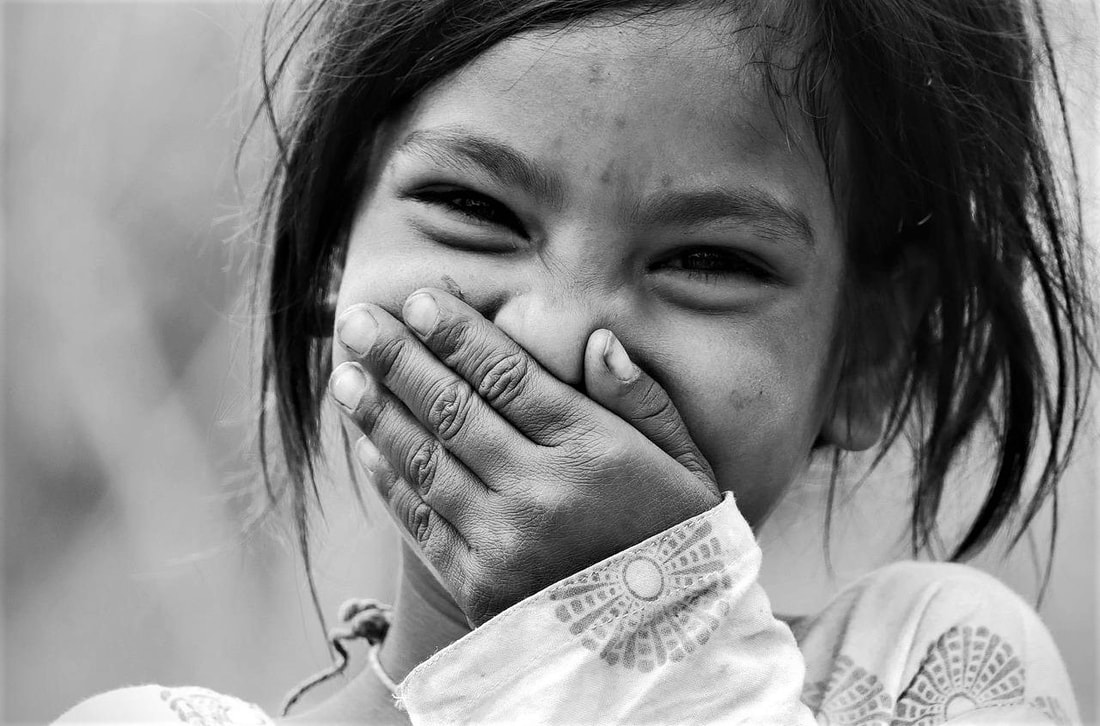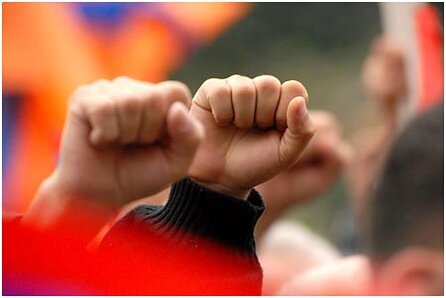|
‘We don’t have a plane crash scheduled for today, but I thought I’d take you through the emergency procedures just in case.’ (KLM Air Hostess) I love the difference that a sense of humour can make. The air hostess (above) made everyone laugh during the passenger safety briefing on a return flight from the Netherlands today. The airline’s own plane had experienced maintenance problems so it had had to borrow one from another airline. One hostess complained, with a glint in her eye, that the green décor didn't match the blue colour of her uniform. The passengers all laughed when another hostess made an announcement too, aiming to draw our attention to an apparent information light on the plane…only to correct herself moments later with, ‘Oh – this plane doesn’t have one!’ Brilliant. It took the terror out of the turbulence. On a more serious note, I had been in the Netherlands to work with a diverse NGO leadership team, to support its desire to enhance its international teamwork. I referenced briefly a couple of places in the Bible where the writer comments on the amazing potential of human diversity – where the Divine whole is seen, known and experienced to be more than the sum of its parts – yet also hints at the corresponding dark risks of undervaluing, fragmentation and conflict if not. Strikingly, the writer moves on in both places to emphasise a deep need for authentic love as the critical success factor. This insight set a spiritual-existential tone for the day, as we reflected on team-as-relationships. Returning to the plane – but this time as a metaphor, a participant from South Africa asked, ‘How many separate parts is a Boeing 747 aircraft made up of?’ Apparently, the answer is about 6,000,000. ‘And what do these diverse components all have in common?’ Puzzled faces all round now. ‘None of them can fly.’ I thought this was genius. What a great way to dispel the myth of the all-sufficient self in the face of the dynamic complexities of teams, organisations and wider world. We worked through an Appreciative Inquiry next, drawing on positives of the past and aspirations of the present to co-create shared trust and vision for the future. Set the trajectory. Fasten seatbelts. Enjoy the flight.
16 Comments
‘If you can remove the hazard, do it. If you can’t do that, do what you can to minimise the impact of the hazard. If you can’t do that, prepare for recovery in the aftermath.’ (Bill Crooks) That was a proud moment. I stepped into the lift in a Phnom Penh hotel and there, blazoned on the wall, was a poster with a stark warning, ‘Don’t even think about it.’ It was a campaign against the child sex tourism trade, led by international Christian NGO World Vision and the Cambodian police. I had just arrived there on assignment with World Vision and, seeing its logo displayed alongside this message, it gave fresh inspiration and passion to my own work. Later that evening, I was taken by World Vision activists into a dark city alleyway to meet with some street children. The workers brought lanterns, food, drink and first aid kits to meet the children’s immediate needs before sitting on the ground to chat with them. I was amazed by the kids’ bright spirits, laughing playfully as they spoke with us. The activists opened picture books and talked the children through how to avoid the dangers of sexual exploitation. It was sobering at the end to watch the children drift off back into the mist and darkness, still smiling and waving at us as they went. I wondered what their lives must be like, eking out an existence by scavenging and begging, and I felt deeply affected by this encounter. I noticed my instinctive desire to rescue these children who were clearly so poor and vulnerable. I was struck, by contrast, by the activists’ approach to developing the children’s own resilience. On asking about this later, the activists explained to me that the scale of the challenge is so great that it dwarfs the physical resources they have to meet it. They had chosen a strategy that enabled them to reach the greatest numbers of children – recognising the hard realities of these kids’ worlds and enabling, where possible, their safety and wellbeing within those contexts. It was protection by preparation and mitigation, by standing alongside in the midst. This agonisingly difficult choice enabled the activists to focus their more intensive support and care on children who were the most vulnerable among the vulnerable; for instance, those who were sick or dying or living with severe disabilities or mental health issues. They partnered with the children, local communities, civil society organisations and central government agencies to catalyse and sustain an effective response. Love in action. We can be hope. How far can action learning (a form of small-group peer coaching) be useful in fast-paced and complex humanitarian contexts, in countries as diverse as Bangladesh, DRC, Iraq, Jordan, Malaysia, Myanmar, Somalia and Syria? What would it take to make coaching and action learning effective in these different cultural environments? These were questions I was invited to explore and test with ALNAP and ALA’s Ruth Cook during the past 18 months.
The idea was to train field-based practitioners in action learning techniques, then to mentor them as they adapted and applied them in disaster zones. Our goal was to learn from this experience too. Travel restrictions meant that workshops were all conducted online, which created its own challenges vis a vis patchy internet connectivity and access to training resources via cell phones, yet we-they persevered and the experience proved fruitful. I was particularly interested in cross-cultural dimensions and dynamics in these training groups. Workers in humanitarian crises face intense time pressures and it could have been tempting to short-cut personal introductions and press ahead with the task. In some cultures, investing in relationship and trust-building is integral to the task and, therefore, inseparable from it. We chose, therefore, to create opportunities, where possible, for participants to get to know and understand us and each other from the outset. In Western models of action learning, emphasis is often placed on posing coaching-type questions that are short, sharp and direct. If, however, we don't pay attention to relevant cultural norms including relational preamble (e.g. ‘I am pleased to be here. Thank you for the opportunity to ask this question…’) such questions can be experienced as blunt, harsh or rude. It's important, therefore, to allow for different cultural framings and expressions. We were aware that, in contexts such as the UK and USA, action learning tends to assume an egalitarian culture within a group, within which participants are and feel free to invite and pose challenging questions to one-another. In some cultures, however, where perceived authority and social status are based on e.g. age, gender or tribe as much as on formal hierarchy, careful composition of and contracting in groups are critical success factors. In some cultures, to pose a question directly to an authority figure could be perceived as insubordinate, disrespectful or even insolent. Authority figures may be expected by others always to have the ‘right’ answers and to pose a question in a group risks shaming that person, a loss of face, if they are unable to answer it. One way to avoid this issue is to invite participants to write down questions and hand them to the person first, who can then chose which to respond to. In some cultures, it would feel inappropriate for a participant to decide unilaterally on an action at the end of an action learning cycle without having first run the idea past their line-manager for approval. This may partly be indicative of where decision-making authority is held in that hierarchy. It can also signal deference to or respect for an authority figure. One way to address this would be for a participant to relate back to the group at a subsequent meeting on what actions have been agreed. When using a peer-consultancy version of action learning, in which participants are invited to offer suggestions for consideration as well as questions, particular challenges can arise. In some cultures, participants may feel compelled to accept the first suggestion that is offered, or to agree to whatever is suggested by a perceived authority figure. Again, writing down questions to offer a presenter can help to address this. When using an appreciative version of action learning, in which participants help a person to identify what personal and contextual factors contributed to the success of an initiative, there can be challenges too. In some cultures, it can turn into a praise-party, with participants wanting to affirm the presenter rather than to tease out success factors. One way to address this is to allow space for praise first, then to move onto the more structured process. In other cultures, a presenter may feel uncomfortable to comment on what they did well personally in case it sounds immodest. Two possible ways to address this are to invite the presenter to comment on what other people may have noticed about his or her contribution, thereby attributing the qualities to a third-party perspective rather than their own, or to depersonalise it as ‘This happened’ rather than ‘I did this.’ I am deeply indebted to all of the participants in this initiative who contributed so richly to our learning and ideas. What have been your experiences of coaching, training or action learning in different cultural environments? What have you learned - and what would you recommend to others? (See also Nick's: Cross-Cultural Action Learning webinar, December 2021) ‘Kairos moments’. Pivotal experiences... I wasn’t trying to be difficult. It felt like an issue of justice. I was in my late teens and this was a trade union meeting in a local town hall. The room was packed full and I sat upstairs in a balcony. The union leaders were in powerful positions, sitting in a row at the front table. Nobody dared to speak or to raise a challenge. To lose membership meant to lose one’s job. ‘We have mortgages to pay and mouths to feed.’ I valued the trade union ideal but, somewhere along the way, this body had lost its visionary, democratic principles. I disliked the way its leaders abused power and traded on fear. After making long, tedious speeches, reminiscent of a bygone communist era, the main leader stood up and asked if anyone had anything to say. A tense and tangible silence filled the room. I could feel my heart pounding and nerves straining throughout my body. I had to say something, I had to speak. So, much to my colleagues’ amazement, I stood up, took a deep breath and advocated a proposal for democratic reform. The whole room gasped…then fell back to stunned silence. The leader, now red with rage, shot me down for daring to challenge his authority – and inadvertently proved my point. I was treated like a hero as I left that day, work mates crowding around, punching my shoulders and patting my back with looks of surprise and admiration. It was a defining moment for me. I had stood up to authority, taken a public stance on my beliefs and values and, by God’s grace, managed to stay diplomatic and assertive. There could be no going back now. I organised a union-wide petition and, as a result, came under threat from union reps who warned me that I was ‘playing with fire’. I resigned, left my job and entered human rights and community development work. I can see a trajectory in my life that had led up to that point, e.g. from when, as a young school boy, I had hated bulling and cruelty to animals and had created an animal rights activist group at school. I can also trace a clear trajectory through my life and career in subsequent years, e.g. in leadership, coaching and OD roles in charities and INGOs, based on my spiritual-existential-humanistic beliefs and values. I still hold that same passion to support people who are poor, vulnerable or oppressed in the world. What have been the defining moments in your life and career? How did you get here? How can I help you work out your career-calling? Get in touch! [email protected] |
Nick WrightI'm a psychological coach, trainer and OD consultant. Curious to discover how can I help you? Get in touch! Like what you read? Simply enter your email address below to receive regular blog updates!
|







 RSS Feed
RSS Feed